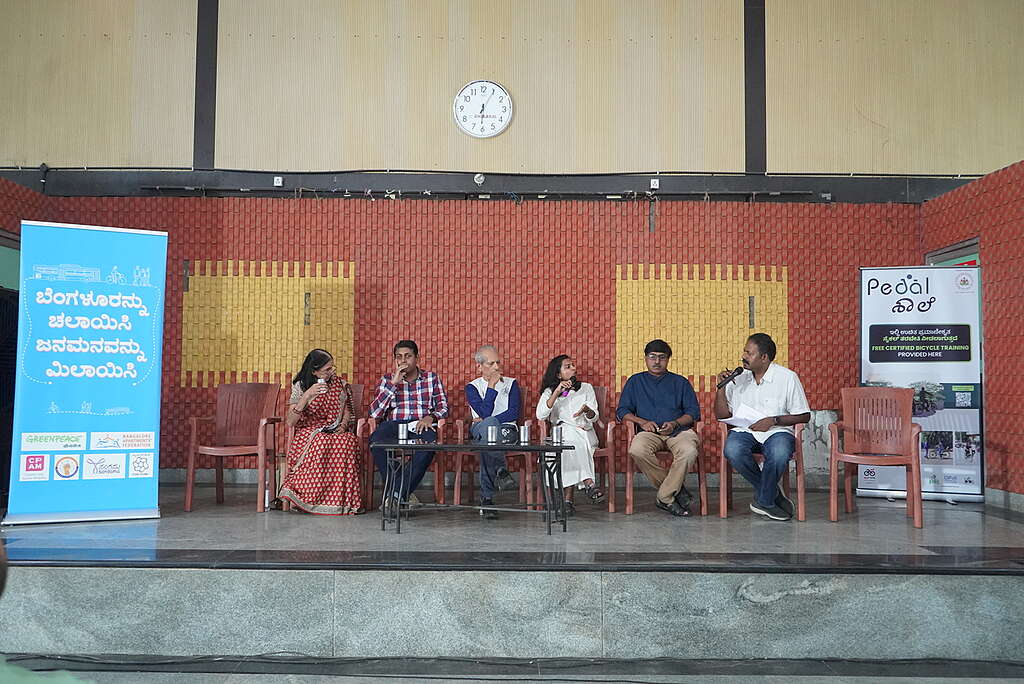
Bengaluru, June 27: Civil society groups in Bengaluru participated in an open citizens assembly – ‘Let’s Move Bengaluru’ to amplify the public voices in building sustainable cities at the press club. In a bid push towards public transport with the expectations to optimize passenger-centric public transport and communicate the practical solutions to policymakers that can be implemented in the city
Professor Rajeev Gowda, Former MP and Spokesperson of the Indian National Congress who was one of the panelists said, “Ridership has jumped by 14 lakh, we can roughly hold it as 7 lakh new bus users in the past 2 weeks…We are definitely short on the fleet and we could look beyond the public bus fleet to meet the new growing demand, maybe work a partnership model with private players, another option is CSR and build funds… We are committed to building the city’s bus fleet to 10000 buses by the end of our term.”
Nearly 162 participants at the assembly also voted in an offline poll asking them – Besides free bus travel for women, in what other ways can we make public buses more efficient and accessible? 15% of the respondents supported the need for women’s only buses, 25% of the respondents felt mini buses would aid last mile connectivity and a whopping 59% of the respondents felt more bus lanes and buses can reduce waiting time and make buses more accessible.
Despite the increase in population and economic activities, the role of public transportation in addressing mobility issues in Bengaluru remains limited. The city has seen an exponential growth in private vehicles, which has touched over a crore, creating frequent and long traffic jams. The government’s choice of infrastructural investment has only augmented this growth.
Professor Ashish Verma, Convernor, IISc Sustainable Transportation Lab said, “Over the past 25 years, the government has heavily invested in the construction of concrete infrastructure, such as flyovers and elevated roads, Only encouraging the purchase of more private vehicles. These only provide temporary relief and do not address the root cause of traffic congestion. Moreover, these projects often come at the cost of environmental degradation, displacement of people, and loss of green spaces.”
Greenpeace campaigner Amruta Nair also raised concerns about the government’s convention of car-centric infrastructure, making mobility exclusive and inaccessible to groups who cannot avail private transport, particularly women. She called for the revival of the 11 Bus Priority Lane as conceived by the DULT under the Comprehensive metropolitan plan.
The introduction of the Shakti Scheme recently was met with a lot of admiration from various stakeholders, but as Yamuna Ganesh, a Garment factory Union Leader pointed out “The scheme remains inadequate with the lack of buses in the city. With most factories and its workers located on the outskirts of the city, BMTC needs to build a more dense network in those localities”. Gajalakshmi – a community member of the Slum Dwellers Federation added that the community in Benson town is not able to use the scheme as the bus routes of the area have been discontinued since Covid 19.
BMTC’s fleet of 6700 buses account for less than 1% of the city’s nearly one crore vehicles, indicating the need for a significant increase in the number of buses. “Ideally, there should be at least 120 buses per lakh population to have better bus services. Doubling the fleet would be a good place to start” said civic activist Srinivas Alavilli.
The Bangalore Apartment Federation also noted that the transportation system in the city is fragmented and uncoordinated, with different modes of transportation operated by different agencies. Resulting in a lack of seamless connectivity between different modes of transportation, calling for the BMTC to work in association with metro authorities to provide first and last-mile connectivity through mini-buses to metro stations.
Public transport is an important tool in combating climate change, and Greenpeace’s most recent analysis on the cities’ AQI revealed that the PM2.5 levels are 5.8 times higher and NO2 levels are nearly 2 times higher than the acceptable Air Quality Standards. This leaves a lot to accomplish in a limited period of time. MS Sharat – Campaigner said, “In times of Climate change and our pursuit of achieving NET Zero, we need to encourage community spaces that share available resources – and public transport is one such communal space which is an absolute necessity in this fight against climate change.” It is essential to address the root cause of traffic congestion and prioritize people’s needs over personal vehicles.
Participating organizations included Greenpeace India, Bangalore Apartment Federation, Slum Dwellers Federation, Power The Pedal Garment Factory workers community, Sangama, Council For Active Mobility and Citizens for Sankey. This citizen assembly has been organized to follow up on the public’s mobility demands submitted in the Mobility manifesto during the Karnataka elections and the promises fulfilled by the government.
For more information contact
Dr. Shrinidhi Adiga, +91 9844239283, [email protected]
Rutwik Khasnis, +91 6364115455, [email protected]
